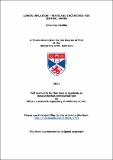Lower inflation : ways and incentives for central banks
Abstract
This thesis is a technical inquiry into remedies for high inflation. In its center there
is the usual tradeoff between inflation aversion on the one hand and some benefit
from inflation via Phillips curve effects on the other hand. Most remarkable and
pioneering work for us is the famous Barro-Gordon model - see (Barro & Gordon
1983a) respectively (Barro & Gordon 1983b). Parts of this model form the basis of
our work here. Though being well known the discretionary equilibrium is suboptimal
the question arises how to overcome this. We will introduce four different models,
each of them giving a different perspective and way of thinking. Each model shows
a (sometimes slightly) different way a central banker might deliver lower inflation
than the one shot Barro-Gordon game at a first glance would suggest. To cut a long
story short we provide a number of reasons for believing that the purely discretionary
equilibrium may be rarely observed in real life.
Further the thesis provides new insights for derivative pricing theories. In particular, the potential role of financial markets and instruments will be a major focus.
We investigate how such instruments can be used for monetary policy. On the contrary these financial securities have strong influence on the behavior of the central
bank. Taking this into account in chapters 3 and 4 we come up with a new method of
pricing inflation linked derivatives. The latter to the best of our knowledge has never been done before - (Persson, Persson & Svenson 2006), as one of very view economic
works taking into account financial markets, is purely focused on the social planer's
problem.
A purely game theoretic approach is done in chapter 2 to change the original
Barro-Gordon. Here we deviate from a purely rational and purely one period wise
thinking. Finally in chapter 5 we model an asymmetric information situation where
the central banker faces a trade off between his current objective on the one hand
and benefit arising from not perfectly informed agents on the other hand. In that
sense the central bank is also concerned about its reputation.
Type
Thesis, PhD Doctor of Philosophy
Collections
Items in the St Andrews Research Repository are protected by copyright, with all rights reserved, unless otherwise indicated.

